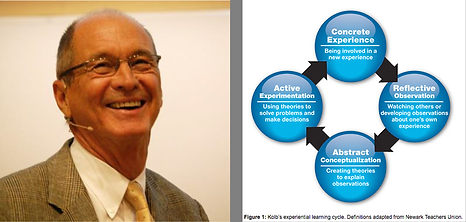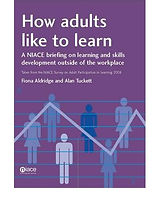
Adult and Community Education in the 1980s
Adult & Community Education in the 1980s.
A little bit of a back story.......
Adult education has been around for a long time. In America, the term can be traced back prior to 1900, (Stubblefield & Rachal, 1992). As the concept of adult and community education continued to evolve in the 1980s, it centered around an increase demand for adult literacy to positively impact the economy, (Rose, 1991). In 1983 Reagan announced the Adult Literacy Initiative. The goal of this initiative was to prioritize literacy among young adults and develop literacy programs (Snyder, 1993) . According to a government study conducted in May 1986, approximately 1 out of every 8 Americans could not read, (Eyre, 2013, p. 18). The Reagan administration also pushed for the use of volunteers as a way of decreasing costs while still dealing with what was seen as a crisis in literacy. It launched the Secretary of Education's Adult Literacy Initiative, (Rose, 1991). This group focused on the use of volunteers to increase literacy activities across the country.
Adult education for the community is based on consumer needs and demands. If it is determined that adults within a particular community are in need of specific programs, then the community looks to develop the programs to meet these needs, (Brookfield, 1993). This decade, educational focus was on excellence, high school curriculum, whole language, old math vs. new math, a new national assessment of education progress, issues of governance, increased adult education program evaluation, and workforce literacy (Eyre, 2013, p.16). The 1980’s were a decade when politicians and educators realized the need to work together to combat issues surrounding financial and education deficits in the United States.
References
Brookfield, S. (1983). Community Adult Education: A Conceptual Analysis. Adult Education Quarterly, 33(3), 154-60.
Eyre, G, Pawloski, R 2013, An American Heritage: Federal Adult Education A Legislative History 1964-2013, US Department of Education, Washington, DC
Rose, A. D., & ERIC Clearinghouse on Adult, C. O. (1991). Ends or Means: An
Overview of the History of the Adult Education Act. Information Series No. 346.
Snyder T.D. ( 1993). 120 years of American Education: A Statistical Portrait. Washington, D.C.: U.S. Dept. of Education. Office of Educational Research and Improvement, National Center for Education Statistics.
Stubblefield, H. W., & Rachal, J. R. (1992). On the Origins of the Term and Meanings of "Adult Education" in the United States. Adult Education Quarterly, 42(2), 106-16.


Educators
Introduction
The 1980s redefined the world of Adult and Community Education. The Reagan administration made adult literacy a priority during this time. Turbulent economic times led to the development of several policies, which encouraged adults to make themselves more marketable in the workplace. Although increasing literacy was important to the Reagan agenda, reducing government funding of education was also a major priority. Because of the reorganization of funds, most money went to formal institutions. This meant that adult learners interested in technical schools and other community educational institutions, had to fund most of their own learning, (Kulich, 1992).
The concept of community education began to evolve with the times. Less funding meant reduced class offerings and a “back to basics” idea of reading, writing, and arithmetic. Adult learning institutions looked for more ways to fully incorporate “community” within their educational programs. An importunate opportunity for a reciprocal relationship was realized. As more and more adults began to study and train in their communities, they gained valuable knowledge and skills to work within the same community and help strengthen the economy.
David Kolb
Who is he?
*Bachelor of Arts in psychology, philosophy and religion at Knox College
*Received Ph.D. in Social Psychology from Harvard University
*Professor of Organizational Behavior and Management.
*Currently the Chairman of EBLS, which he founded to advance research and practice on experiential learning.
His contributions....
*Research on experiential learning and learning styles
*Developed many experiential exercise and self-assessment instruments, including Kolb Learning Style Inventory 4.0.

His perspective......
* Best learning does not come from a teacher or book, but rather first-hand experiences and observations.
DAVID KOLB IN HIS OWN WORDS.
VIDEO COURTSEY OF YOUTUBE


His perspective......
*Adults learn both inside and outside of the classroom in both formal and informal settings.
ALAN TUCKETT
VIDEO COURTESY OF YOUTUBE
Alan Tuckett
Who is he?
*Served as president of the International Council of Adult Education from 1988-2011
*Bachelor of Arts in English and American Literature
*Currently the Chairman of EBLS, which he founded to advance research and practice on experiential learning.
His contributions....
* Credited with inventing the concept of the “adult learner”.
*Started the British adult literacy campaign in the 1970s.
*Started Adult Learners Week
Organizations

Introduction
The American Association for Adult and Continuing Education (AAACE) and American Job Centers (One-Stop Centers), also known in Indiana as WorkOne are two organizations in the United States, which offer services and workshops, that provide training and educational information to individuals seeking to increase their skills. The AAACE partners with adult educators and other professionals of varying backgrounds to educate practitioners regarding theories in adult education as well as share information regarding trends in current practice in teaching, training, planning and program evaluation. The AAACE also strives to develop strong leadership skills within their group in order to strengthen theory and practice within the field of adult and community education. American Job Centers offers assistance to both adults and older youth in many different areas of career development, including employment training and job readiness as well as other individualized supportive services for those looking to enter or re-enter the workforce or make a career change. This is done through a large variety of services. These services all have the same end goal, which is employment for the individual.
American Association for Adult and Continuing Education (AAACE)

Background
*Founded in 1982
* Based in Atlanta, Georgia
Mission and Goals
To provide leadership, growth, and development in adult and continuing education
Core Programs
Commission Groups
-
Adult Basic Education and Literacy (CABEL)
-
Affiliated Organizations (CAO)
-
Community, Minority, and Non-formal Education (CCMNFE)
-
International Adult Education (CIAE)
-
Professors of Adult Education (CPAE)
-
Program Management (CPM)
-
Workforce and Professional Development (CWPD)
Program Organization
Commission groups are organized by the director. Special interest groups are organized by members.
Special Interest Groups
-
Adult Development,
-
Adult Education Staff Development
-
Adult Psychology and Counseling Colleges and Universities,
-
Community Colleges
-
Cooperative Extension
-
Correctional Institutions Health Professionals
-
History and Philosophy of Adult Education
-
Human Resource Development & Training
-
Labor/Workforce Education
-
Military
-
Minority and Human Rights
-
Popular Education
-
Religious Education
-
Research and Practice
-
Special Learning Needs/Disabled
-
Sustainability and Environmental
-
Adult Education Undergraduate
-
Adult Learner
-
Vocational & Career Education
-
Women's Issues
-
Status & Education
Program Goals
To unify educators and have a central place to share information, research, and to problem-solve.
Implications
Established policies and procedures for educators and organizations. Developed groups to discuss and problem-solve issues within the field. Conduct and discuss research with other professionals in the field. Collaborated with other organizations to continue improving those working in and learning in adult education environments.
Comparison of Programs
Commission groups are organized as formal groups to establish policy and procedures and an overall awareness of what is going on in the field of adult education. Special interest groups were developed so members have a place to discuss and problem-solve issues directly affecting education and educators. Both programs offer a unified location for all professionals in the field to collaborate, share, and problem solve issues and concerns in the field.
American Job Center

Background
*Founded in 1989
* One in every state
Mission and Goals
To deliver integrated, easy-to-understand workforce information that helps job seekers, students, workers, workforce intermediaries, and employers develop their capacity and make sound economic decisions in the new economy.
Core Programs
Workforce Development
Career Planning/Training
-
Career Advisors
-
Guidance and Counseling
-
Short-term Occupational
-
Industry Recognized Certifications
Adult Education and Literacy
-
High School Equivalency (HSE) Assistance
-
English as a Second Language (ESL)
-
Basic Computer Courses
Skills Assessment
-
Test of Adult Basic Education (TABE)
-
WorkKeys - Test of Basic Work Skills
-
Worldwide Interactive Network (WIN) - Test of Career/College Readiness/Soft Skills
Job Search
-
Online Database
Veteran's Assistance
-
Job Placement
-
Training Assistance
-
Education Assistance
Youth Programs
-
Jobs for America’s Graduates (JAG)
Vocational Rehabilitation
-
Counseling and Guidance
-
Discovery- Job Coaches
-
Supported Employment
-
Trial Work Experiences
-
Assistive Technology
Employer HR Assistance
-
Job Postings
-
Candidate Selection
-
Job Fairs
Offender Reentry
(Felony Convictions)
-
Job Placement
-
Expungement Assistance
Program Organization
State divided Workforce Development Regions. Local elected officials appointment of Workforce Development Board (WDB) members. WDB hires administrators and service providers, who coordinate local delivery of partner services through the local offices within each state.
Program Goals
Collaborate with local, state, private, and public entities that provide comprehensive and innovative employment services and resources to meet the needs of the workforce.
Enable individuals to find the help they need in the areas of job training, employment services, and other related support services, in one location.
To increase job seeker and employer awareness of workforce development resources available across the country.Differences and Similarities Commision groups were organized to have formal groups to establish policy and procedures and an overall awareness of what is going on in the field of adult education. Special interest groups were developed so members had a place to discuss and problem-solve issues directly affecting education and educators.
Implications
Provides a variety resources in a free and efficient way allowing the public to use them 24/7 to find, obtain and retain employment.
Comparison of Programs
Developed by the workforce investment act of 1988. Each state must provide an American Job Center. Anyone can go to the center and learn about skills and jobs.
References
Atkinson, G., Jr., & Murrell, P. H. (1988). Kolb's Experiential Learning Theory: A Meta-Model for Career Exploration. Journal Of Counseling & Development, 66(8), 374.
Beckett, F. (2000, May 22). Will you still teach me when I'm 85? New Statesman, 129 (4487), 21-22.
Camden, B. (2017, December 29). Adult learning champion honoured with knighthood. FE Week, Retrieved from https://feweek.co.uk/
Case Western Reserve. (n.d.). David Kolb | Weatherhead. Retrieved fromhttps://weatherhead.case.edu/executive-education/instructors/david-kolb
Cherry. K. (2017, May 24). David Kolb Psychologist Biography. Retrieved March 3, 2018 from https://www.verywellmind/david-kolb-biography-2795505
Cherry, K. (2017, September 6). Experiential Learning Theory of David Kolb. Retrieved March 3, 2018 from https://www.verywellmind.com/experiential-learning-2795154
Healey, M., & Jenkins, A. (2000). Kolb's Experiential Learning Theory and Its Application in Geography in Higher Education. Journal Of Geography, 99(5), 185-95.
Kolb, A. [Alice]. N.d. Posts [LinkedIn page]. Retrieved March 8, 2018 fromhttps://www.linkedin.com/in/alice-kolb-92477925/
Kolb, A. Y., & Kolb, D. A. (2005). Learning Styles and Learning Spaces: Enhancing Experiential Learning in Higher Education. Academy Of Management Learning & Education, 4(2), 193-212. doi:10.5465/AMLE.2005.17268566
Kolb, D. [David]. N.d. Posts [LinkedIn page]. Retrieved March 8, 2018 from https://www.linkedin.com/in/david-kolb-18b07519/
Kolb's Learning Styles. (n.d.). Retrieved March 08, 2018, from https://www.businessballs.com/self-awareness//kolbs-learning-styles-64/
Kulich, J. (1992). Adult education through a rear view mirror: The changing face of adult education over the last.. Convergence, 25(4), 42.
Low, G. (2011). A Tribute to Alan Tuckett. Education Journal, (128), 33
McLeod, S. A. (2017). Kolb - Learning Styles. Retrieved from www.simplypsychology.org/learning-kolb.html
Murray, C. (2018, January 12). Sir Alan Tuckett: Former NIACE CEO, Founder of Adult Learner’s Week FE Week, Retrieved from https://feweek.co.uk
Nash, I. (2014). A guru's collected reflections on the state of adult education. Education Journal, (210), 12-13.
Wilby, P. (2014, October 21). Alan Tuckett: the man who invented the “adult learner”. The Guardian Weekly, Retrieved from https://www.theguardian.com
Wlv.ac.uk. (2018). Alan Tuckett - University of Wolverhampton. [online] Available at: https://www.wlv.ac.uk/about-us/our-schools-and-institutes/faculty-of-education-health-and-wellbeing/staff-directory/alan-tuckett/ [Accessed 5 Mar. 2018].
American Job Centers (One-Stop Centers). (2017, January 09). Retrieved March 20, 2018, from
https://www.dol.gov/general/topic/training/onestop
Adult Education Quarterly (AEQ). (2013). Retrieved from: http://aeq.sagepub.com/
Adult Learning (AL). (2013). Retrieved from http://journals.sagepub.com/home/alx
Dean, David, John Pepper, Robert Schmidt, and Steven Stern. “The Effects of Vocational
Rehabilitation for People with Mental Illness.” Working paper, 2011. Available at
http://people.virginia.edu/~sns5r/resint/vocrehstf/vocrehmi.pdf.
Fact Sheet: One‐Stop Career Centers [WIOA Fact Sheet]. (n.d.).
Indiana One-Stop Center Certification Review Form [PDF]. (2016, October). Indianapolis:
Indiana Department of Workforce Development (DWD).
Journal of Transformative Education (JTED). (2013). Retrieved from
http://journals.sagepub.com/home/jtd
Rose, A. D. (2008). AAACE: Where are we going and where have we been? The Future of
AAACE in light of its Past. Adult Learning, 19(1/2), 34-36.
Rosen, S. (1997). One stop on the road to full employment. Social Policy, 28(2), 26-30.
Schmidt, S. W. (2013). Perspectives in adult education—The American Association for Adult
and Continuing Education (AAACE): Its history, purpose, and activities. New Horizons
in Adult Education & Human Resource Development 26(1), 55-59.
Smith, T. J. (2013). One stop service center initiative: Strategies for serving persons with
disabilities. Journal of Rehabilitation, 79(1), 30-36. Retrieved from
https://search-proquest-com.proxy.bsu.edu/docview/1283771013?accountid=8483
The American Association for Adult and Continuing Education (AAACE). (2018). Retrieved
from: http://www.aaace.org/?page=InterestGroups
Van Roy, M. (2015). The Impact of Co-locating American Job Centers on Community College
Campuses in North Carolina. North Carolina: Center for Analysis of Postsecondary
Education and Employment (CAPSEE).
We want to thank you for taking the time to view our page.